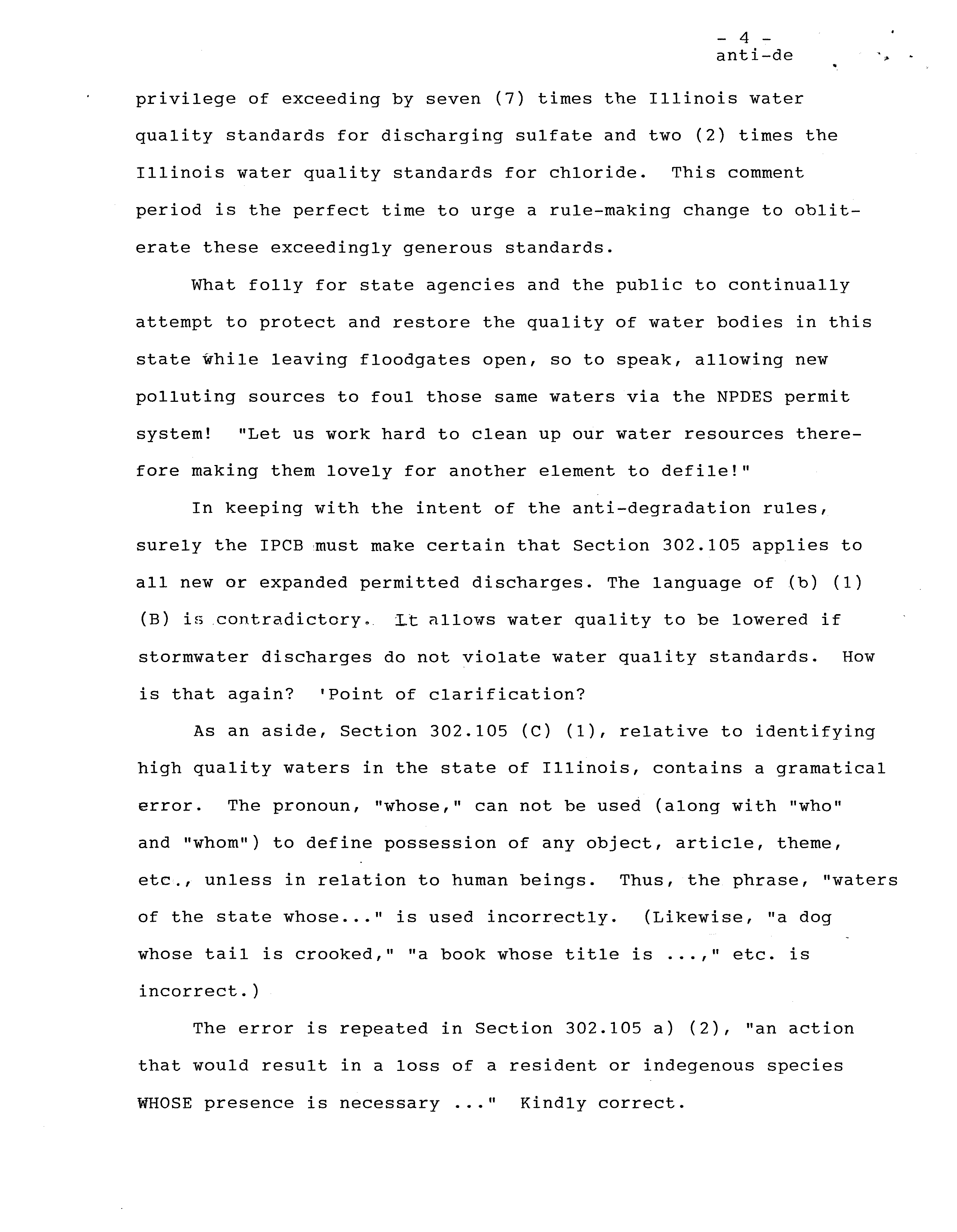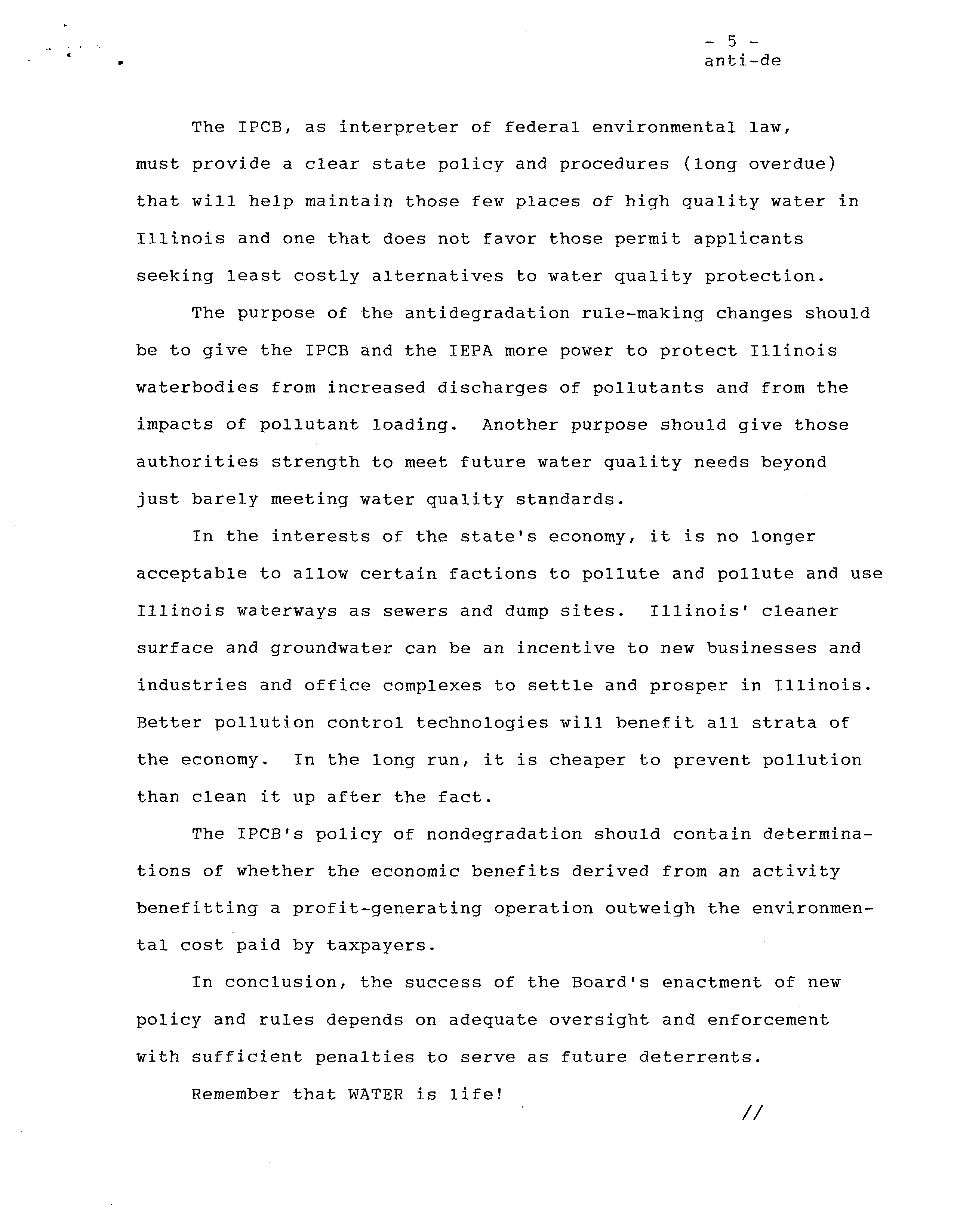December 17, 2000
To: Ms. Dorothy Gunn, Clerk
Illinois Pollution Control Board
CLER~’S~Fr!~
100 West Randolph Street
Suite 11—500
~
~
inn
~UJL
Chicago, Illinois 60601
STATE OF ~L1JNOIS
Fr:
Jane Johnson, President
Prairie-Woods Environmental Coalition
1776 Knox Hwy. 11
Gilson, Il 61436
and
Karen Hudson, President
Families Against Rural Messes
~9.
~•
22514 West Claybaugh Road
Elmwood, Il 61529
Re: Public Comment, R01-13
In the Matter of the
Proposed Revisions to Antidegradation Rules,
35 Iii. Administrative Code 302.105, 303.205, 303.206 and
106.990
—
106.995
The Prairie-Woods Environmental Coalition, (PWEC), a grass-
roots organization promoting conservation education in Knox County,
Illinois schools and the Families Against Rural Messes (F.A.R.M.)
organized to educate and encourage responsible stewardship of land
and water, promote rural health and craft laws and regulations
supporting those goals offer the following:
The focus of the proposed amendments to Section 302.105,
must be to maintain the integrity of the cleaner waters of the
state of Illinois. It is time that the Illinois Pollution Control
Board (IPCB) and the Illinois Environmental Protection Agency
(IEPA) adopt beneficial water resource antidegradation rules and
enforce them. Sinceenactment of the Clean Water Act (CWA),
citizens have been relying on the IPCB and the IEPA to oversee and
protect the quality and safety of Illinois water resources but the
agencies have not had in—hand all the tools necessary for the job.
The proposed amendments to the above referenced citations,
corrected and refined by citizen participation in the decision—
making process, must be adopted so as to maintain the integrity of
the cleaner waters of the state.
—2—
anti—de
Section 302.105 (a) requiring that the IPCB must maintain
and protect the water bodies of Illinois by not permitting any
action that will 1) result indeterioration of any existing water
community or cause 2) a loss of an indigenous species beneficial
to commercial or recreational activities is confining and un-
necessary and should be stricken. All indigenous species should
be protected.
Overall, the IPCB proposed amendments must protect the state’s
higher quality and biologically significant water resources, even
where a pollutant which has the potential to violate any water
quality standards is released on a temporary basis.
Under 106.992, citizens can petition to have certain Illinois
water bodies designated 0i~tstandingWater Resources (OWR) in order
to protect them from future pollution but for the public to make
use of that offer, burdensome and unnecessary criteria have been
imposed. Generally, the public does not have the ways and means
to investigate the potential economic impacts of an OWR designation
on any given business. What is needed is a fair set of rules clear-
ly wr±tten. The petition process should be instituted and encourag-
ed without the above requirement and others of that nature becoming
a requisite.
Clearly, the burdensome petition process described in Sub-
part L of the Rules will discourage the public from ever attempting
to petition any waterway in the state for OWR designation. The
IPCB, acting fairly in all aspects of the process and as a guardian,
must relax the huge burden of proof and notification required of
the public for an OWR designation.
—3—
anti—de
Surely in modern times, the IPCB can devise a smoother way
for an OWR petitioner to notify interested parties of intent,
than for the petitioner to furnish a multitude of lengthly peti-
tions to them. In order for those interested parties to be
sufficiently served, why can’t the regulators set up a system
similar to the one successfully used to notify the public of
tentatively issued National POllution Elimination Discharge
System ~NPDES) permits, the Public Notice Fact Sheet?
Under Section 303.205 (b), excluding intermittent stream
segments with a zero 7Q10 flow from candidacy for OWR designation
is a mistake. A case could be made that the receiving waters of
discharge from a NPDES permitted operation could be into an (at
sometime) intermittent stream. All intermittent streams have their
place in the riverine ecosystem.
The citation, 302.105 (b)(2)(C) under the NPDES permit process
puzzles me. How can an action set to improve the quality of
water bodies in Illinois, be achieved if an increase in water
pollutant loading is proposed?
The NPDES general permitting rules should be overhauled to
guarantee that the applicant furnish specific antidegradation
review of the proposed operation. The revised rules should require
permitting agencies to very seriously research the environmental
harm the applicant will cause to all the waters of the state,
making high quality waters off—limits to new pollution.
A threat to existing Illinois water quality regulation is
the standard found in 302.208 (g) for sulfate and chloride dis-
charges into the waters of the state allowed in the NPDES permitting
process. An applicant intending to open a coal mine is granted the
—4-
anti—de
privilege of exceeding by seven (7) times the Illinois water
quality standards for discharging sulfate and two (2) times the
Illinois water quality standards for chloride. This comment
period is the perfect time to urge a rule-making change to oblit-
erate these exceedingly generous standards.
What folly for state agencies and the public to continually
attempt to protect and restore the quality of water bodies in this
state while leaving floodgates open, so to speak, allowing new
polluting sources to foul those same waters via the NPDES permit
system! “Let us work hard to clean up our water resources there-
fore making them lovely for another element to defile!”
In keeping with the intent of the anti—degradation rules,
surely the IPCB must make certain that Section 302.105 applies to
all new or expanded permitted discharges. The language of (b) (1)
(B) is contradictory.. it allows water quality to be lowered if
stormwater discharges do not violate water quality standards. How
is that again? ‘Point of clarification?
As an aside, Section 302.105 (C) (1), relative to identifying
high quality waters in the state of Illinois, contains a gramatical
error. The pronoun, “whose,” can not be used (along with “who”
and “whom”) to define possession of any object, article, theme,
etc., unless in relation to human beings. Thus, the phrase, “waters
of the state whose...” is used incorrectly. (Likewise, “a dog
whose tail is crooked,” “a book whose title is
...,“
etc. is
incorrect.)
The error is repeated in Section 302.105 a) (2), “an action
that would result in a loss of a resident or indegenous species
WHOSE presence is necessary
.“
Kindly correct.
—5—
anti—de
The IPCB, as interpreter of federal environmental law,
must provide a clear state policy and procedures (long overdue)
that will help maintain those few places of high quality water in
Illinois and one that does not favor those permit applicants
seeking least costly alternatives to water quality protection.
The purpose of the antidegradation rule—making changes should
be to give the IPCB and the IEPA more power to protect Illinois
waterbodies from increased discharges of pollutants and from the
impacts of pollutant loading. Another purpose should give those
authorities strength to meet future water quality needs beyond
just barely meeting water quality standards.
In the interests of the state’s economy, it is no longer
acceptable to allow certain factions to pollute and pollute and use
Illinois waterways as sewers and dump sites. Illinois’ cleaner
surface and groundwater can be an incentive to new businesses and
industries and office complexes to settle and prosper in Illinois.
Better pollution control technologies will benefit all strata of
the economy. In the long run, it is cheaper to prevent pollution
than clean it up after the fact.
The IPCB’s policy of nondegradation should contain determina-
tions of whether the economic benefits derived from an activity
benefitting a profit-generating operation outweigh the environmen-
tal cost paid by taxpayers.
In conclusion, the success of the Board’s enactment of new
policy and rules depends on adequate oversight and enforcement
with sufficient penalties to serve as future deterrents.
Remember that WATER is life!
1/
S






